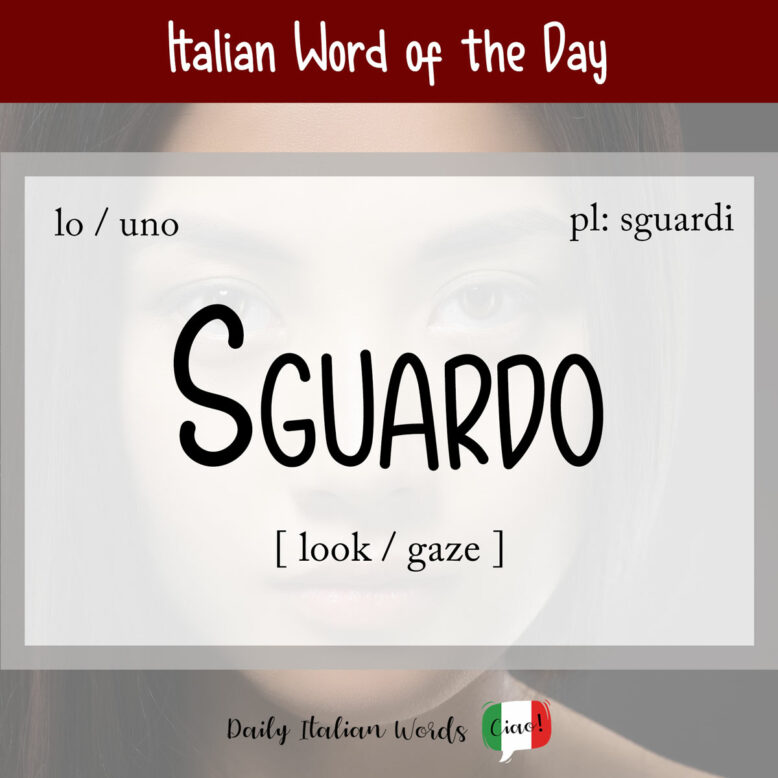One of the most common words used to refer to a person’s look, gaze or glance in Italian is sguardo.
sguardo
gaze / look

Sguardo comes from the archaic verb sguardare, which in turn is derived from guardare with the addition of the s- prefix.
It is a masculine noun but given that it begins with sg-, it takes the following definite and indefinite articles rather than il / i / un / dei.
- lo sguardo = the gaze
- gli sguardi = the gazes
- uno sguardo = a gaze
- degli sguardi = some gazes

Sguardo can mean four different things in Italian:
1. the act of looking or gazing at someone or something
When this is the meaning, it can often be substituted with the synonyms occhiata and guardata.
Diamo uno sguardo veloce al giornale.
Let’s take a quick look at the newspaper.
It may also be accompanied by any of the following verbs:
- alzare lo sguardo = to look up
- accarezzare con lo sguardo = to gaze at
- appuntare lo sguardo = to stare at
- dare uno sguardo = to have a look
- distogliere lo sguardo = to look away
- incrociare lo sguardo = to exchange glances
- posare lo sguardo = to direct one’s glance
- reggere lo sguardo = to hold X’s gaze
- rivolgere lo sguardo su X = to turn one’s attention to X
- rivolgere lo sguardo verso X = to turn one’s gaze toward X
- ricambiare lo sguardo a qualcuno = to glance back at someone
- sostenere lo sguardo di qualcuno = to stare back at someone
- spegnere lo sguardo = to take one’s eyes off X
- tendere lo sguardo a X = to direct one’s eyes toward X
- al primo sguardo = at first glance
2. the way in which a person looks at someone or something
When describing the nature of a sguardo, it’s common to use adjectives such as malizioso (malicious), gentile (kind), dolce (sweet), pietoso (compassionate), tenero (tender), or sprezzante (scornful), to name a few.
Instead of using adjectives like dolce or pietoso directly, you could also opt for expressions like di dolcezza (of sweetness) or di pietà (of pity/compassion), using di (of) plus the corresponding noun instead.
It is also common to see the expression pieno di (full of) + noun, as in the example below.
Con uno sguardo pieno di tenerezza, ha preso suo figlio in braccio.
With a gaze full of tenderness, she picked up her son.
3. a person’s visual capacity
In this case, sguardo is simply a synonym for vista or capacità visuale.
Ci sono campi fin dove arriva lo sguardo.
There are fields as far as the eye can see.
4. field of view, view or panorama (figurative)
Here, sguardo is a synonym for veduta, vista or panorama.
Dalla nostra terrazza ti puoi godere un fantastico sguardo su tutta la città.
From our terrace, you can enjoy a great view of the whole city.
It is from this meaning that we get the word bellosguardo, a word used to describe a place from which you can enjoy a beautiful view. It is also the name given to many places in Italy, such as the town Bellosguardo in the province of Salerno.
Heather Broster is a graduate with honours in linguistics from the University of Western Ontario. She is an aspiring polyglot, proficient in English and Italian, as well as Japanese, Welsh, and French to varying degrees of fluency. Originally from Toronto, Heather has resided in various countries, notably Italy for a period of six years. Her primary focus lies in the fields of language acquisition, education, and bilingual instruction.


